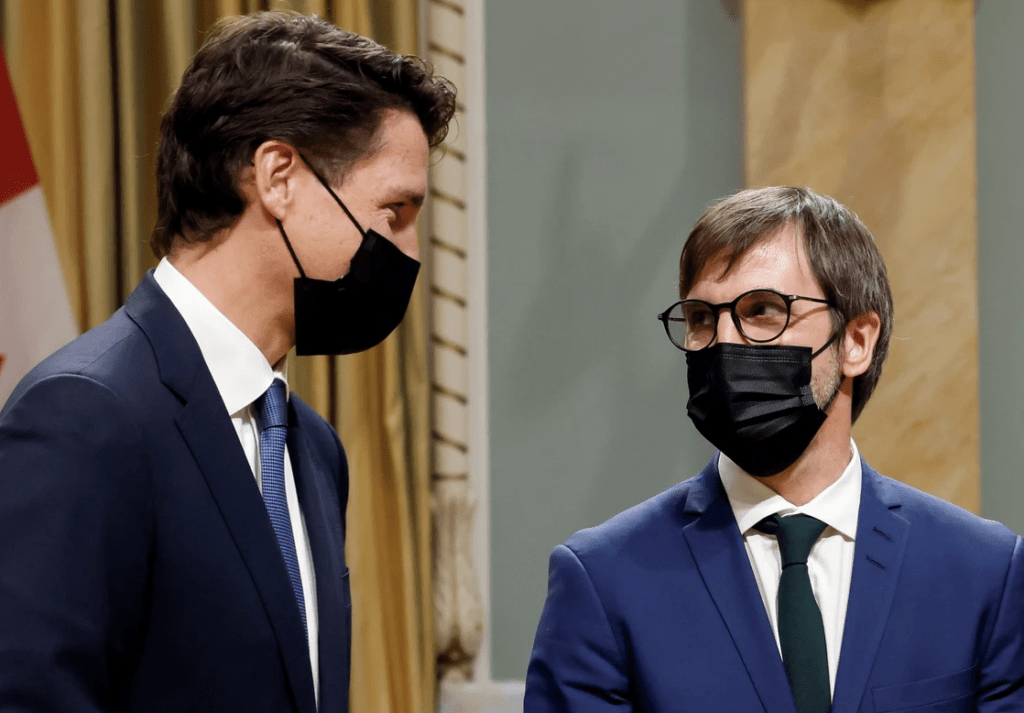Guilbeault’s Deep-End Dive Into his Own Pool at COP26

Reuters
Canada’s new Environment and Climate Change minister, Steven Guilbeault, is packing his bags for Glasgow. Luckily, this is not his first COP rodeo.
Elizabeth May
October 27, 2021
Five days ahead of the opening of COP26 in Glasgow, Canada has a new minister for Environment and Climate Change. We’ve had this sort of last-minute, drop-a-new-minister-into-a-COP before. In 2015, Catherine McKenna was sworn in on November 4th with COP21 opening in Paris on November 30th. Following the 2019 election, Jonathan Wilkinson was sworn in as Environment and Climate Change minister on November 20th, with COP25 in Madrid opening December 2nd. Not much time to learn the files before “Off you go, welcome to the deep end!”
Now it is Steven Guilbeault, sworn in with five days’ notice and off to a key negotiation in Glasgow at COP26. But this time is different.
Guilbeault is our first Environment and Climate Change minister who can take an effortless dive into the deep end. He is the first minister to assume this portfolio who has attended many previous COPs. In fact, he has been to 19. I think his first may have been Kyoto – COP3 in 1997. Guilbeault led both Équiterre and Greenpeace Quebec before entering elected politics. In 2001, he scaled the CN Tower as an act of climate change civil disobedience. No one else is dropping this minister in at the deep end. It’s his pool.
In the other big move for climate, Jonathan Wilkinson goes to Natural Resources. I feel certain that he takes his commitment to climate action with him to his new portfolio. I think he, like the prime minister, has claimed climate leadership more than delivering on it. But I trust he will approach Natural Resources Canada with a climate agenda.
Meanwhile, a less noticeable move to advance the climate work of this government is Dominic Leblanc’s additional portfolio. He retains Intergovernmental Affairs and now has responsibility for Infrastructure and Communities. This third piece of a climate mandate could help gain support from provinces, and particularly from municipal governments.
The immediate reaction from western observers, notably CTV’s Don Martin, was that this Cabinet would be seen as hostile to Alberta’s oil patch. “Cue the outrage from Alberta premier Jason Kenney,” Martin cracked in his post-cabinet shuffle column, just before Alberta Premier Jason Kenney unleashed his outrage.
It is municipalities in Canada that retain the best track record for climate action. Thanks to Paul Martin’s decision as Finance Minister back in 2003 to give the Federation of Canadian Municipalities (FCM) a revolving fund for municipal climate action, significant progress has been made locally. If Leblanc uses his dual responsibilities for leverage, climate action could be advanced.
The immediate reaction from western observers, notably CTV’s Don Martin, was that this Cabinet would be seen as hostile to Alberta’s oil patch. “Cue the outrage from Alberta premier Jason Kenney,” Martin cracked in his post-cabinet shuffle column, just before Alberta Premier Jason Kenney unleashed his outrage.
Perhaps the political winds are blowing so ill for Jason Kenney that his outrage carries little force. The recent scolding of the Alberta government for its wasteful inquiry into environmental groups may leave them somewhat chastened. A $3.5 million inquiry, in the end, found no wrongdoing by any environmental group, nor did it find anything nefarious in “foreign funding.” Commissioner Steve Allan found that activities were justified as free speech and that there was no evidence that motivations were other than those explicit.
Fighting climate change means moving off fossil fuels. Period, end of sentence. The International Energy Agency (IEA) now makes it clear that holding to our Paris goals requires no new fossil fuel infrastructure.
Among other realities for both Ottawa and Edmonton to ponder, that means canceling the Trans Mountain Expansion Project (TMX).
COP26 needs leaders. Canada remains a laggard. We will find out in Glasgow if this Cabinet shuffle has real significance.
Trudeau has raised hopes by putting Guilbeault in Environment and Climate Change. We will know as the prime minister leaves the podium if we are rising to the occasion or just torquing public relations.
One last point of note is that the Fisheries minister is once again a B.C. minister. Joyce Murray, herself a former B.C. environment minister, knows more than a thing or two about the crisis facing Pacific salmon. A victim of global warming and loss of habitat, our wild salmon are facing extinction.
In a welcome move by former minister Bernadette Jordan, aquaculture operations in our open waters that were contaminating wild salmon with lice and disease, were being restricted. Meanwhile, Canada has allowed genetically modified salmon to be raised in land-based pens and approved for human consumption. Many British Columbians will be looking for real and stronger action from our new Fisheries minister to get open-pen aquaculture out of our waters, to restore salmon habitat and follow up on recommendations from the Parliamentary Committee on Fisheries and Oceans.
In a minority parliament, I am committed to finding ways to highlight areas of common agreement to move as fast as possible to ensure a liveable world. We do not have much time to make critical progress.
Contributing Writer Elizabeth May, former leader of the Green Party of Canada, is the MP for Saanich-Gulf Islands. She’s a veteran of COP conferences going back to Rio in 1992, and will be filing for Policy from COP26 in Glasgow.
